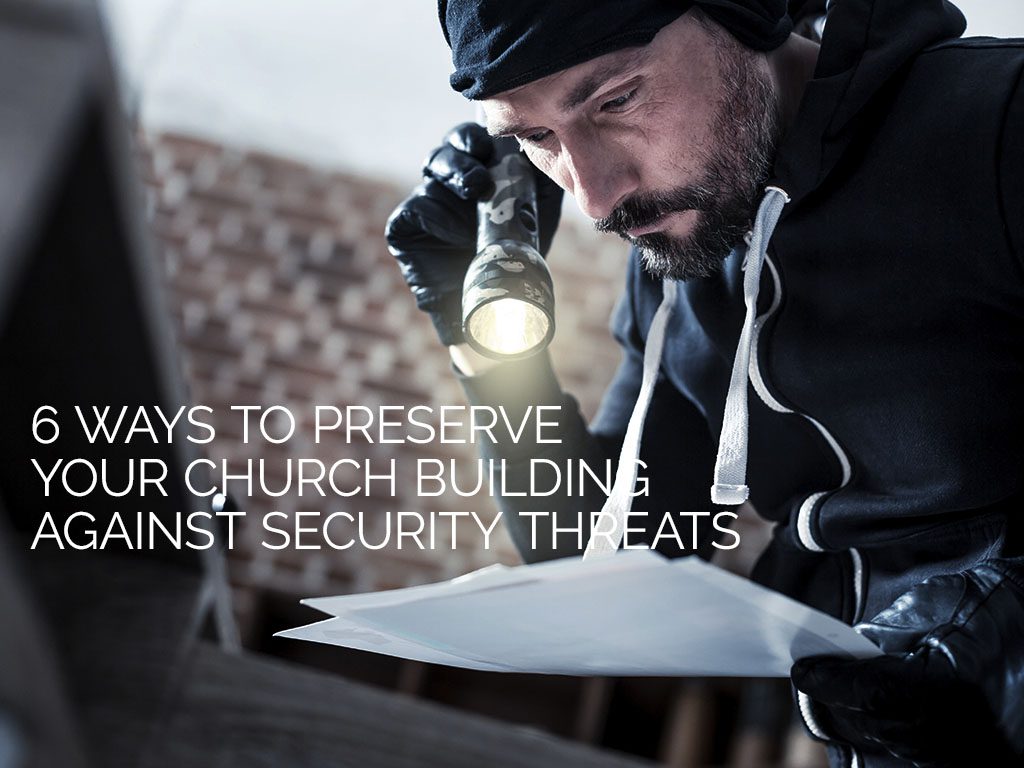Churches are meant to be sanctuaries with open doors and safe spiritual spaces where people can enter and worship in peace and harmony. Church building security is a topic that has become critical in the last ten years and people want to know how they can make their churches safer. With the right protocols and systems in place, keeping a church community physically protected and safe from unauthorized access, theft or violence is possible.
This might seem like a daunting task and many may not know where to begin. Pastors and churches leaders can take action to ensure the security and the safety of their buildings and the members and groups that use them.
Here are six ways to preserve your church building against security threats:
1) Address Church Security Openly
Engaging church leaders about security is a first step toward normalizing its place in a church's list of priorities. Talking about how to create a culture of safety rather than fear is optimal; deciding how and when to talk about it is even more important. A good first step could be mentioning it in the church newsletter.
After meeting with church members and leaders it may be time to bring the conversation into church services to share updates and make announcements. Creating a secure environment and a feeling of safety for your members and guests is the goal.
2) Create a Church Security Plan
Once church security is a priority, a plan can then be developed for how to establish, manage, and/or sustain security operations. This plan can be simplified or elaborated to meet the unique needs of each church and its buildings. The goal is to integrate church security into the normal ‘business' of the church.
Collaborating with pastors, church communicators, and leaders, as well as local security professionals, will benefit any security plan. Or perhaps your church already has a security system in place and simply needs to make sure it is updated and that your security team is aware of the most recent advancements in technology and tools available to help. This safety plan can coincide with other emergency response and/or evacuation plans as well.
3) Launch a Church Security Ministry
Creating a church safety team and ministry may be an excellent way to offer members and church leaders a way to get involved in the business of the church. A dedicated ministry can certainly elevate safety and security planning to a new level by opening opportunities for volunteers to contribute. Creating opportunities for participation gives members an excellent way to further connect and build relationships, and contribute to the church's well-being.
Many churches may have active or retired law enforcement, military personnel, firefighters, emergency response, or medical professionals in their congregations that would like to lend their expertise to help the church security ministry. As planning begins, make sure to extend a welcome to anyone who may be interested and who may have a professional background or connection that can help the church.
4) Be “In-the-Know”
To have confidence that your church is safe, it is helpful to know what is going on inside the church buildings as well as who is in the buildings at all times. One way to easily monitor who is coming in and out of your church is to know who has the ability to unlock doors.
This can be achieved in two ways:
- Create an access control system that alerts you to door activities – when doors are opened, when doors are propped open or left ajar, and when an unauthorized person is attempting to gain access
- Set-up a video surveillance system – preferably one that integrates with the access control system so video can be viewed from the same platform as door events
An integrated security platform makes it easy to set alerts and gives the flexibility to access church security from mobile devices. For individuals entrusted with access credentials (ie. key-holders), there is also a record of exactly who accessed your church and when.
If integrated with video surveillance, these access events are tied to video so you can SEE exactly what transpired at a specific point and time and view real-time video. The bottom line is this: whether you are at your church or not, you are in-the-know when using an integrated security platform.
5) Make it Manageable
Church buildings are used for multiple purposes. Your church might house a preschool, a meeting place for Bible study groups or choir practices, and it is often a place where the clergy hold meetings. All these activities happen at different times and are run by different people. Knowing who is using the church buildings and is on the church campus at any time of the day or night is vital. Managing, tracking, and adjusting who has access to your church can be simplified by switching to a new platform with the click of a button.
Cloud-based access controls make it possible for churches to maintain control and manage all church building use efficiently. From one interface, church administrators can perform three main actions:
- Create accounts for key-holders and send credentials to their smartphones so they can open doors with their mobile device
- Deactivate access credentials at any time for any “key-holder”
- Lock and unlock doors remotely if someone is locked out and create lock schedules so doors automatically lock and unlock at specific times
No matter how well you attempt to track keys, it is impossible to control who makes copies, who loses them or who shares them without permission. The more keys floating around to your church buildings, the more vulnerable your church is to unauthorized access. The bottom line is this: physical keys become unmanageable.
6) Upgrade the First Line of Defense
Church doors open to welcome people into services and special events. Doors are also the first line of defense to keep unauthorized or emergency situations out of your church. A traditional lock-and-key solution does not necessarily offer the convenience and high level of security to protect churches today. Exploring and implementing security technology built for today’s needs can help churches find more effective ways to secure church doors.
Church security of the future is built on a one cloud-based security platform that will:
- Automate – by saving valuable time, manual work, and providing viewing of access records and videos remotely from your mobile device
- Simplify – by managing all components from one system, including access controls, videos, and setting up alerts for unexpected access events
- Secure – by granting or revoking access, setting up access schedules based on employee permissions, and granting temporary access to volunteers
The bottom line is this: churches can now go beyond traditional security to make sure church doors and buildings are always secure. Automate the security of your church with a scalable security platform that simply combines access control, video surveillance, and mobile access and management.
Churches have communities to serve and blessed work to do. Do not let church safety weigh heavy on the minds of members, pastors or church leaders. Take steps today to start talking about church security and making a plan. This is your sanctuary and your community. Keep it safe.





This is great – thanks for the advice!